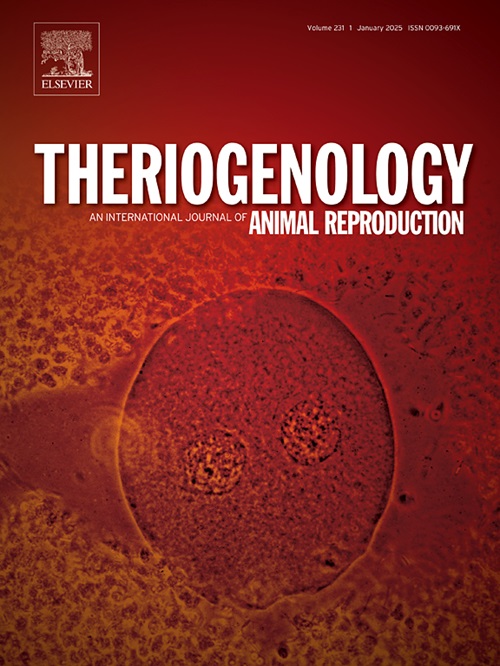Cumulus cells and the TNF-alpha signaling facilitate aging of ovine oocytes
IF 2.4
2区 农林科学
Q3 REPRODUCTIVE BIOLOGY
引用次数: 0
Abstract
Post-maturation oocyte aging (PMOA) is known to significantly impair the developmental potential of oocytes; however, comprehensive studies on ovine PMOA remain limited. In mice, cumulus cells (CCs) accelerate oocyte aging by releasing cytokines, but the roles of CCs and cytokines in PMOA of domestic animals are poorly understood. This study aimed to elucidate the involvement of CCs and tumor necrosis factor (TNF)-α in the PMOA of ovine oocytes. Our findings reveal that PMOA significantly reduced blastocyst rates and the expression of development-promoting genes, while increasing oocyte degeneration and activation rates, along with expression of development-inhibiting genes, compared to newly matured oocytes. These detrimental effects were more pronounced in oocytes aged as cumulus-oocyte complexes than as cumulus-denuded oocytes. Additionally, PMOA led to increased apoptotic rates, TNF-α production, and TNF receptor 1 (TNFR1) expression in CCs, coupled with a significant reduction in the expression of anti-apoptotic genes. Mature oocytes expressed TNFR1, with levels decreasing significantly during PMOA. Importantly, the addition of the TNF-α antagonist Etanercept to the aging medium markedly improved parthenogenetic embryo development and the expression of competence-related genes, while mitigating CC apoptosis during PMOA of COCs. In conclusion, PMOA compromises developmental potential while heightening oocyte degeneration and activation sensitivity in ovine oocytes. Cumulus cells exacerbate PMOA through increased TNF-α signaling activity, highlighting the potential of TNF-α antagonists as therapeutic agents to counteract the deleterious effects of PMOA.
求助全文
约1分钟内获得全文
求助全文
来源期刊

Theriogenology
农林科学-生殖生物学
CiteScore
5.50
自引率
14.30%
发文量
387
审稿时长
72 days
期刊介绍:
Theriogenology provides an international forum for researchers, clinicians, and industry professionals in animal reproductive biology. This acclaimed journal publishes articles on a wide range of topics in reproductive and developmental biology, of domestic mammal, avian, and aquatic species as well as wild species which are the object of veterinary care in research or conservation programs.
 求助内容:
求助内容: 应助结果提醒方式:
应助结果提醒方式:


